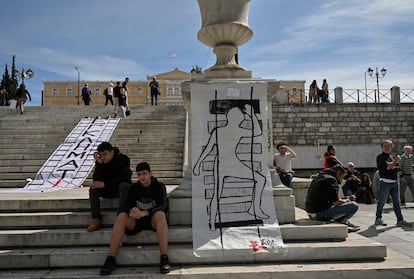Greece train crash: Government support falls as election looms
The deadly accident is weighing heavily on the minds of voters, but so far the leftist Syriza has been unable to capitalize on the anti-government sentiment


The recent deadly train crash in Greece has upturned the outlook for the country’s upcoming election. Before the February 28 disaster, which killed 57 people when a passenger train collided head-on with a freight train, the conservative New Democracy party was confident they would be reelected. But polls taken after the tragedy show that government support has fallen sharply. According to the polls, New Democracy remains in the lead, but the leftist Syriza group is now just five percentage points behind.
Greek Prime Minister Kyriakos Mitsotakis initially blamed the accident entirely on the stationmaster, who was the first to be charged. But as criticism mounted, he changed his position. “We take responsibility and we cannot, should not and do not want to hide behind a series of human errors,” he said two days later, in reference to the country’s poor railway infrastructure and well-known deficiencies. Opposition parties, however, argued the message was opportunist.
“There is a widespread feeling that the government is not guaranteeing the security of rail transportations and does not want to clear up what happened to avoid punishing those who were really responsible [for the train crash],” Tania Karagianni, the co-spokesperson for Syriza told EL PAÍS.
According to Karagianni, the government is trying to push the idea that “everyone was to blame” to avoid taking responsibility. “Citizens have formed an opinion [on the crash] and it, obviously, will be expressed at the polls on the day of the election.”
The European Front of Royalist Disobedience, known as Mera25, has also criticized the government for its handling of the accident. According to Erik Edman, a member of Mera25 – which was founded in 2018 by former finance minister and Syriza member Yanis Varoufakis –, Mitsotakis “invested all his resources into launching a communication-based damage control exercise.” Meanwhile, Dimitris Koutsoubas, the general secretary of the Communist Party (KKE), blames all the parties that have governed Greece, i.e. New Democracy, Pasok and Syriza, as well as European austerity policies.
A date for the election has still not been called. Three days after the tragedy, journalist and analyst Dimitris Kouklouperis published an article in the Greek daily Efimerida ton Sintakton, in which he claimed the Mitsotakis administration had planned to call elections for April 9, but postponed the date following the train crash. Sources close to the government told EL PAÍS that while the local media expect the elections to take place in May, the prime minister is considering putting them off until the beginning of summer on the grounds that more work needs to be done.
But while government support has fallen, Syriza – which was founded by former Greek prime minister Alexis Tsipras – has not appeared to have benefitted from the drop. The first voter intention survey released after the accident on March 9 showed the biggest drop in support for New Democracy since it came to office, but it did not report a proportional rise for Syriza. Two more polls, released March 10 and 11, indicated a similar result, with New Democracy falling by three percentage points to between 33.7% and 35.5%, and Syriza remaining at around 30%.
Greece’s other opposition parties suggest that Syriza has been unable to capitalize on the government discontent, as the party was responsible for completing the privatization of the country’s rail network. Karagianni argues that while the former Tsipras government privatized passenger rail services, the rail lines, infrastructure and network remained the responsibility of the state. But analyst Kouklouperis believes these actions are still “fresh in the memory of the people” and the “key reason why [the party] has not been able to take the lead.”
Meanwhile, Mitsotakis is trying to rebuild support with popular measures such as raising the minimum wage and anti-bullying laws in schools. But Kouklouperis believes this will not be enough. He has no doubt that the train tragedy will weigh heavily on the minds of voters, but is unsure whether it will lead to a political shift or abstentionism. “Parties that have not governed or have been against privatizations may benefit,” he told EL PAÍS.
Sign up for our weekly newsletter to get more English-language news coverage from EL PAÍS USA Edition
Tu suscripción se está usando en otro dispositivo
¿Quieres añadir otro usuario a tu suscripción?
Si continúas leyendo en este dispositivo, no se podrá leer en el otro.
FlechaTu suscripción se está usando en otro dispositivo y solo puedes acceder a EL PAÍS desde un dispositivo a la vez.
Si quieres compartir tu cuenta, cambia tu suscripción a la modalidad Premium, así podrás añadir otro usuario. Cada uno accederá con su propia cuenta de email, lo que os permitirá personalizar vuestra experiencia en EL PAÍS.
¿Tienes una suscripción de empresa? Accede aquí para contratar más cuentas.
En el caso de no saber quién está usando tu cuenta, te recomendamos cambiar tu contraseña aquí.
Si decides continuar compartiendo tu cuenta, este mensaje se mostrará en tu dispositivo y en el de la otra persona que está usando tu cuenta de forma indefinida, afectando a tu experiencia de lectura. Puedes consultar aquí los términos y condiciones de la suscripción digital.








































